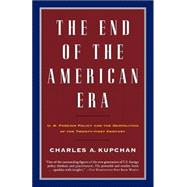
Note: Supplemental materials are not guaranteed with Rental or Used book purchases.
Purchase Benefits
What is included with this book?
| Acknowledgments | p. v |
| Preface to the 2003 Vintage Edition | p. ix |
| Preface to the 2002 Knopf Edition | p. xv |
| Grand Strategy and the Paradox of American Power | p. 3 |
| America's New Map of the World | p. 36 |
| The False Promise of Globalization and Democracy | p. 77 |
| The Rise of Europe | p. 119 |
| The Limits of American Internationalism--Looking Back | p. 160 |
| The Limits of American Internationalism--Looking Ahead | p. 202 |
| After Pax Americana | p. 247 |
| The Rebirth of History | p. 304 |
| Notes | p. 337 |
| Select Bibliography | p. 365 |
| Index | p. 375 |
| Table of Contents provided by Ingram. All Rights Reserved. |
The New copy of this book will include any supplemental materials advertised. Please check the title of the book to determine if it should include any access cards, study guides, lab manuals, CDs, etc.
The Used, Rental and eBook copies of this book are not guaranteed to include any supplemental materials. Typically, only the book itself is included. This is true even if the title states it includes any access cards, study guides, lab manuals, CDs, etc.
Excerpted from The End of the American Era: U. S. Foreign Policy and the Geopolitics of the Twenty-First Century by Charles Kupchan
All rights reserved by the original copyright owners. Excerpts are provided for display purposes only and may not be reproduced, reprinted or distributed without the written permission of the publisher.